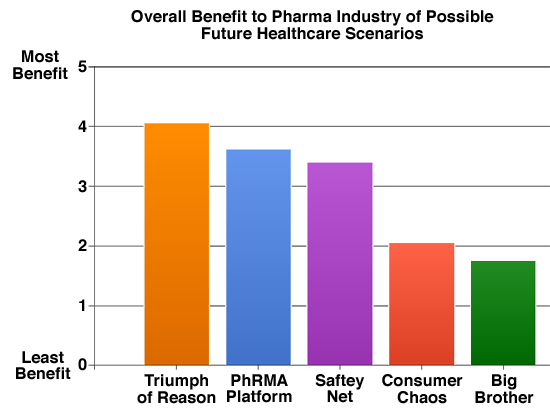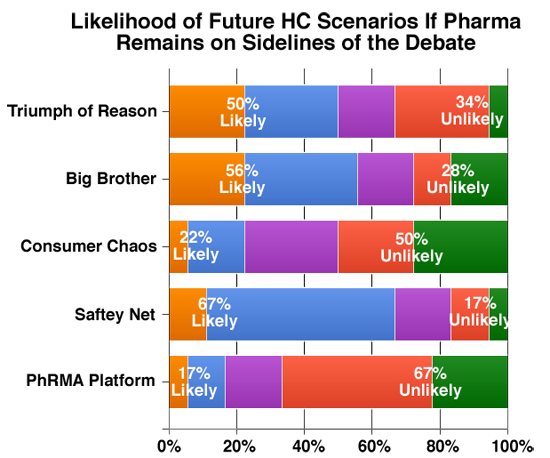Which Future US Health Care Scenario is Best for Pharma? Should the Drug Industry Support Comparative-Effectiveness Research?
(Survey ran from 19 March 2009 through 1 August 2011. N=29 respondents)
See Resources & Further Reading below…

Kim Slocum, President of KDS Consulting, LLC, and former Director, Strategic Planning & Business Development at AstraZeneca, suggests that the pharmaceutical industry faces at least three likely future healthcare scenarios in the US that will have an impact on its business and profits:
- “The Triumph of Reason” — Supported by evidence-based medicine, widespread use of health information technology to support real-time comparative effectiveness review, and value-based reimbursement for innovative biopharmaceuticals.
- “Big Brother Arrives” — Gov’t “fixes” the health cost problem (ie, single payer system) and determines who has access to health care.
- “Consumer Chaos” — Involves the acceleration of trends shifting the costs of health care and decision-making authority to consumers.
Slocum also mentioned a fourth, blended scenario, which may be called “Safety Net” — Government run, price-controlled system that covers primary care, generic medications, basic chronic disease care and catastrophic hospitalizations. People with more money could “trade up” with their own money to better standards of care. This is much like the healthcare system we see in Australia.
A fifth alternative is the scenario endorsed by PhRMA, the US drug industry trade association. Call it “PhRMA’s Platform.” You can read more about here. It emphasizes affordable health insurance and choice for all Americans rather than a government-run insurance plan. The plan depends upon “expanding private health insurance coverage through new refundable tax credits targeted at low-wage, small businesses and providing individual subsidies for low- and moderate income families to purchase coverage on their own or through new pooling arrangements” and upon Medicaid and SCHIP as safety nets.
This survey asks respondents’ opinions about the relative benefit to the drug industry of the above possible future healthcare scenarios as well as their opinions on other important issues, including:
- Will Comparative-Effectiveness Research/Review (CER) lower drug costs?
- Will CER lead to European-style rationing in which patients are denied lifesaving therapies to save money?
- Is CER bound to reduce brand drug companies’ bottom lines?
- Will CER lead to better healthcare outcomes?
- Will CER not take into account that some drugs work better on some people than on others?
- Will CER based on real-time outcomes review help identify drug safety issues and save lives?
- Is the only real threat of CER to have it done badly, by people whose only interest is in reducing costs?
- Should congress create a government-run health plan that competes with private plans?
Survey Results:
The overall results are summarized in charts below. Access a more detailed online Summary of Responses plus view comments from respondents here.
Respondents were asked to rank each of the following different future scenarios, which are described above, in terms of overall benefit to the pharmaceutical industry (choices ranged from 0 – Least Benefit to 5 – Most Benefit):
- The Triumph of Reason
- Big Brother Arrives
- Consumer Chaos
- Safety Net
- PhRMA’s Platform

As a corollary to the above, respondents were asked to indicate how likely or unlikely the above scenarios will unfold over the next decade in the U.S. IF THE PHARMACEUTICAL INDUSTRY REMAINS ON THE SIDELINES OR NEUTRAL (Choices: Very Likely, Somewhat Likely, No Opinion/Neutral, Somewhat Unlikely, Very Unlikely):

Respondents were asked to indicate their level of agreement or disagreement with the following statements regarding “Comparative-Effectiveness” Research (CER). (Choices: Strongly Agree, Somewhat Agree, Neutral, Somewhat Disagree, Strongly Disagree):
- CER will lower drug costs
- CER will lead to European-style rationing in which patients are denied lifesaving therapies to save money
- CER is bound to reduce brand drug companies’ bottom lines
- CER will lead to better healthcare outcomes
- CER will not take into account that some drugs work better on some people than on others
- CER based on real-time outcomes review will help identify drug safety issues and save lives
- The only real threat of CER is to have it done badly, by people whose only interest is in reducing costs

- PMN Article: Will Healthcare be Rationed or Rational?.




![6 Digital Tools at the Center of Healthcare Digitalization [INFOGRAPHIC]](http://ec2-54-175-84-28.compute-1.amazonaws.com/pharma-mkting.com/wp-content/uploads/2021/04/6DigitalTools_600px-100x70.jpg)




